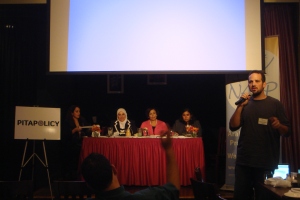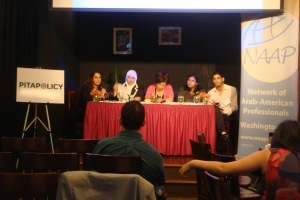By: Ramah Kudaimi
Summary of Roundtable hosted by the Network of Arab-American Professionals-DC Chapter & PITAPOLICY Consulting
For Ahmed Shihab-Eldin, the liberating power of social media is something which he experienced personally. The co-host of Al Jazeera’s “The Stream”- a show which taps into social media to uncover unheard voices and new perspectives- told the audience at last week’s media roundtable held by NAAP-DC and PITAPOLICY Consulting that for years after 9/11, Western media exclusively highlighted one narrative of Muslims and Arabs which focused on violence, extremism and terrorism. When he would search “Ahmed” on Youtube, the first video which would pop up was entitled “Ahmed the Terrorist” and had almost seven million views. But with the uprisings sweeping the Arab world, the power of social media to change this narrative has been on display. On a personal level, while Ahmed was traveling on a train in the United States a few weeks ago, he saw that #flagman was trending on Twitter. In a few clicks he learned that a young man had scaled the Israeli embassy in Cairo and replaced the Israeli flag with an Egyptian one, symbolizing the empowerment Egyptians felt in demanding their leaders represent their interests. And this flagman’s name was Ahmed, a stark contrast to Ahmed the terrorist.
On the macro level, social media has changed business as usual in the Arab world. Dr. Sahar Khamis, an expert on Arab and Middle Eastern media and author of Islam Dot Com: Contemporary Islamic Discourses in Cyberspace, explained that there have been two dangerous extremes in regards to analysis of recent events, especially those in Egypt. On one end the role of social media is underestimated by some who claim that the uprisings would have happened anyways. On the other end the role is overestimated as seen by those labeling what happened as the “Facebook revolution”
“Social media represent catalysts for change,” Dr. Sahar said. “It complements and supplements desires for reform.”
Egypt is unique amongst the countries experiencing upheavals because it had a vibrant and dynamic scene for change before January 25, the first day of major protests. This included opposition papers, alternative voices on private satellite channels and on the ground organizing such as the Keffiyeh (Enough) movement.
“But what failed in the past was being able to mobilize large numbers of people,” Dr. Sahar pointed out. “With the help of social media, larger numbers were able to be rallied and engaged with the protests. This was due to cascades of information which were facilitated by social media.” This is particularly significant for the Arab world due to the overall youthfulness of the region: 70 percent of people are under the age of 30. As Facebook statuses and Tweets were being shared and passed around, people were able to feel each other out and realized that their neighbors shared the same resentment and anger and were then encouraged to do something about it.
Social media also allows people to transcend borders, something which is particularly significant for Palestinian activism explained Will Youmans, founder of Kabobfest. Due to the deterritorialization of Palestinians, their struggle has been a transnational one, making social media an ideal platform for organizing. These tools have also led to the flattening of hierarchies, as new clusters of communication have developed amongst people, and the decentering of ideas and narratives. No longer do Western media hold an overall sway over information.
“These applications have helped the Palestinian cause spread outside of traditional media constraints,” Will said. “Being a part of an online community which is pro-Palestinian allows one to feel less of a target.” Increased Palestinian engagement and activism worldwide through social media platforms are encouraging alternative methods of mobilization away from the traditional political leadership and, Will hopes, will lead to the same type of empowerment other Arabs in the region are now realizing.
This recent and intense focus on social media though cannot take away from the continuing significant role more traditional media outlets play in the region, especially television. For example the Cairo News Company had 70 live broadcasts during the 18 days of protests which rocked Egypt. Several of its reporters were attacked and multiple times its offices were closed forcing reporters to work from various secret locations. Hanan El-Badry, the DC Bureau Chief, was responsible for making sure the stories and images being collected back in Egypt were reaching the international media. As the state run stations and newspapers were either completely ignoring the protests or claiming that protesters were committing acts of violence, it was the responsibility of El-Badry and other independent television reporters to counter such claims with their own reports. Traditional media also help verify information posted online. While in Egypt there were actual reporters on the ground, said Anar Virji, Deputy Program Editor at Al Jazeera English, in other places like Yemen and Syria there have been major restrictions on the freedom of journalists to travel and report. Thus it becomes more difficult to confirm videos and stories posted online and then pass them on to viewers and readers.
Regimes have also learned from the experience of Egypt and have made it more difficult to make use of social media as a mobilizing tool.
“While in Egypt the government was taken by surprise and not prepared,” Dr. Sahar said, “Syria realized its people’s lack in technological savvy and prepared themselves to hack websites and take actions against protesters in the online realm.”
There is still much to be accomplished in the Arab world but whatever difficulties protesters must overcome towards achieving their goals, it cannot be denied that social media has expanded civic engagement and further eroded media exclusivity. And this means many more, like Ahmed, will experience the invigorating power of social media.
Ramah Kudaimi is a Master of Arts Candidate in Conflict Resolution at the Department of Government at Georgetown University. She may be reached at Rkudaimi@gmail.com. Tweet Ramah @ramahkudaimi.




Pingback: The “Palestinian Spring,” Activism and Social Media | KABOBfest